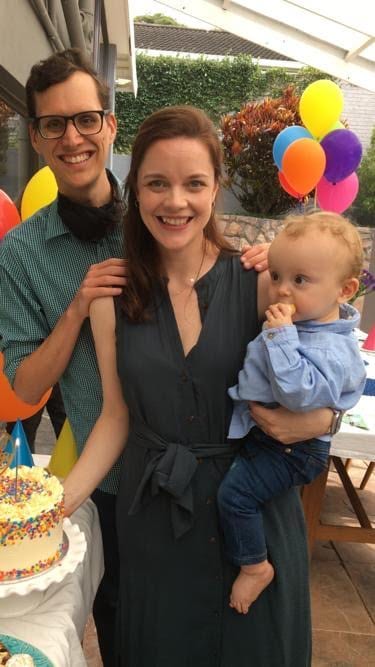
If you’ve worked in audit, you’ve heard a million stories about people who have left the public accounting/auditing world for industry, in search of better pay and fewer hours. But how many accountants have you heard of who left for industry, rose up the ranks, and then left it all to go back to auditing (no doubt taking a reasonable pay cut in the process)?

Meet Ruan Gertenbach: an auditor who left a manager position at PwC in 2015 then spent a whopping 5 years in industry. In September 2020, Ruan rejoined PwC as a senior manager in audit. I don’t know about you, but as someone who’s worked in a Big 4 firm for over 7 years and seen hundreds leave, this is the first time I’ve known someone who came back.
If there’s anything we could all use a dose of, it’s perspective. Naysayers are a dime a dozen so I was itching to catch up with Ruan to understand what on earth was going through his mind, and what drove him back to a place where it can feel like people are lining up to leave.
Read Ruan’s insightful interview answers below.
Q: When did you leave PwC?
A: My last day was 30 October 2015.
Q: What was your motivation for leaving audit at that time?
A: I think everyone who stays in audit has, at one point or another, fantasies about being on the other side of the table and passing problems onto someone else. We came off the back of a very long audit when the client approached me with a Group Financial Accountant position. The role included group reporting, listing requirements and accounting technical compliance. Enjoying technical accounting I had always said the position I would love to try in commerce was one that was technical, so this was the perfect position at the time to try out.
Q: What roles did you perform after your time at PwC, and what did you love/dislike about each role?
A: My first position was Group Financial Accountant at the head office of a large food manufacturer. I enjoyed the position in that it was really technical and included what I enjoyed doing most: technical accounting. Being in commerce, however, the technical accounting matters were few and boredom soon set in!
Within a year I moved to the Group Management Accountant position, which was more senior than the Financial Accountant position as it had more face time with the CFO and CEO. The position included managing cost centres and keeping an eye on various department heads throughout the business. I enjoyed the interaction with the senior executives and learning about the way they had seen the business. At a group level, management accounting becomes a bit of a reporting and coordinating role. It involves presenting the information to the CFO and CEO in a way that helps with decision making; the only problem is that the decision makers already receive updates from the business unit heads long in advance of my reports making it to their desks!
After another year I had an opportunity to join another company as Financial Manager: Corporate. The role was really up my alley! At a smaller listed company the role had oversight of the shared service functions and technical accounting. I owned the financial reporting risk environment, taxation and interacted closely with the company secretary on compliance with the listings requirements. I was able to enjoy a vast amount of freedom to experiment in process optimisation and automation. Unfortunately, we were thinly resourced and the commitments became very onerous with extremely long hours. This was a two year period I really enjoyed despite the long hours.
I then moved to an even smaller listed company where I was the FM responsible for one of the operating business units. Sadly, realised quickly that my interest in technical matters such as taxation, accounting and process optimisation, would not be achieved in a position that had more of a commercial focus. The commercial aspects around procurement, currency risk management and cash flow management were just not what drove my interests.
Q: In 2020, you decided to come back to PwC as a senior manager in audit. Obviously, this is a rather uncommon move and almost certainly would have come at the cost of a rather significant pay cut. Everyone’s thinking it: WHY did you make the move back?
A: During my time in commerce I missed applying my mind to technical matters and developing the CA’s [chartered accountants] of tomorrow. I had a strong sense whilst in commerce that we needed to focus critically on building a different type of CA – one driven by transparency and business motives that are broader than oneself. I had a feeling that for me to play a part in limiting the financial scandals we have seen over the last number of years that I would be better placed in an audit firm, where I could build trust in society and develop the CA’s which were needed to take us forward into a new era and restore the profession to its former glory. It is a tall ask – but I feel like I’m contributing somehow!
Q: Would you say it was more the pull of PwC/audit, or a push from not enjoying industry, that convinced you to make the move back?
A: It’s an altruistic calling I just can’t explain!
Q: What’s your experience been since returning to audit? What are the biggest challenges, and do you feel vindicated by your decision?
A: The biggest challenge I’ve experienced since coming back is that I forgot how demanding and busy audit can be! Not that commerce is a walk in the park, believe me, but audit is really non-stop. It has been difficult to adjust having come back to PwC, now having a family. Setting clear boundaries is something I still struggle with on a daily basis. I do, however, feel that I am making a difference in the lives of the trainees and ensuring stakeholder interests are protected.
Q: Given you were out of audit for a while, how have you gone about getting up to speed with changes in firm methodology, new accounting standards and also changes in firm technology? Has much changed at all, really?
Although not much has changed in terms of methodology it feels like everything has changed! I did have a very slow start, which I am grateful for. It gave me plenty of time to read the PwC Audit guide again. On the accounting side, I was involved in the implementation of both IFRS 15 and IFRS 16 whilst working in industry; lucky for me, I’m almost an expert on these when it comes to all the tricks!
What has certainly changed are all the new tools available to us and the leap that has been made in becoming more focused on digital .
Q: You’re a family man now. Back in audit, what are the things you’re making an effort to do differently the second time around that improves your quality of life?
The main thing is to set clear boundaries. I have made a point of telling people that I don’t work at night (unless it is really urgent) but should I need to put in some hours to get things done, I do them very early in the morning whilst the family is asleep. I have ambitions which I know will take extra commitments. Sleep is something I am willing to sacrifice, but not the family.
Q: A lot of the allure of audit is working with many people who are a similar age. Do you feel there’s any change in you being able to relate to the majority of your teams as a result of being a few years older?
A: It certainly was a bit of a shock coming back and suddenly feeling so much older! In commerce I often still felt like the baby, sitting in manco meetings where the average age was in excess of 40 years, and having team members getting ready for retirement. I have, however, gotten used to the ways of working of the younger crowd and often enjoy the questioning which they bring; we might never be best mates but we will certainly enjoy a few beers together once this COVID business settles down.
Q: Are there skills you learned in your time in industry that you think will be particularly useful/relevant for your “new” role in audit?
A: The key skills I really picked up on was what business thought of the audit process and its much easier for me to put myself in my clients position. The ability to clearly communicate and have early engagement is critical to a smooth audit. I also think that I’m less ‘scared’ of upsetting the client and talking about overruns. By doing things in the right spirit, early on, and being direct, it is often a smoother process.
Business certainly made me realise that being a little blunt is not always a bad thing!
Q: If you could give any advice to someone who is currently in audit and thinking of branching out into industry, what would it be?
A: Give it a go – someone once told me you need to experience as much as possible before you decide on your career path, so go for it!
Q: If someone does move out into industry, what advice would you give in order for them to get the most fulfilment out of an industry role?
A: Use the skills you developed in audit: question often and build a network within your business. Business – especially larger business – can become siloed, so smash the silos using what you learnt whilst dealing with clients on audits.
A lot of what Ruan has written about really echoes the things I have found most valuable about working in professional services. When I do eventually leave, these will also be the things I miss the most.
What are your thoughts? Would you do the same? Are you someone who feels like they’ve jumped the gun and left for industry, but aren’t brave enough to admit it publicly? Let us know in the comments below!
Have any more questions for Ruan? Leave them in the comment section and I’ll see if I can persuade him to pop in and answer a few soon!
- Avoiding Tears and Tantrums: Giving Negative Feedback Like a Pro - December 14, 2022
- An AI has this advice to young professionals for 2023 - November 24, 2022
- When’s the last time you prioritised yourself? - May 3, 2022

Leave a Reply